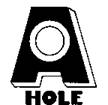
March 2009 Issue
TTAB Cases
In re Jibjab Media, Inc.,
App. No. 78951377 (TTAB Feb. 4, 2009)
ABSTRACT
The TTAB affirmed the refusal to register the mark A-HOLE PATROL for an online social club that screens offensive and inappropriate material submitted by users on the ground that the mark consists of immoral or scandalous matter.
CASE SUMMARY
FACTS
Jibjab Media, Inc. (“Applicant”) filed an application to register the mark A-HOLE PATROL for an “online social club that screens jokes submitted by users to control offensive and inappropriate conduct” in Class 41. The Examining Attorney refused registration on the ground that the mark consisted of or comprised immoral or scandalous matter. The Examining Attorney relied upon several dictionary definitions and Internet articles as evidence that A-HOLE is another term for the word “asshole,” and thus is scandalous.
Applicant admitted that “asshole” would not be an appropriate registered trademark, but argued that the evidence showed that A-HOLE was a more polite and sanitized substitute for “asshole.” Applicant also submitted evidence that A-HOLE had an alternate meaning as a shorthand reference to “analog hole,” and that the PTO previously registered the third-party mark below, as well as several other third-party marks containing the term “ass.”

In addition, Applicant submitted the declaration of its Director of Operations attesting that since the launch of its A-HOLE PATROL service in April 2006, he had never encountered any user complaints that the mark was viewed as offensive, vulgar, profane, indecent, or otherwise inappropriate.
ANALYSIS
A showing that a mark is vulgar is sufficient to establish that it consists of or comprises scandalous matter within the meaning of Section 2(a) of the Lanham Act. To meet its burden of showing vulgarity, the PTO must consider the mark in the context of the marketplace as applied to the goods or services. The “scandalous” determination must be found from the standpoint of a substantial composite of the general public, which is not necessarily a majority. In cases in which the evidence demonstrates that the term in question only has one pertinent meaning, dictionary definitions alone can suffice to satisfy the PTO’s burden of establishing that such term is scandalous.
The TTAB considered the dictionary definitions of record and found that they uniformly indicated that the term “asshole” was a vulgar term for either a stupid, contemptible, or detestable person, or a body part. Further, the evidence showed that the term “a-hole” was used to refer to someone who was an “asshole.” The TTAB also pointed to Applicant’s specimen of use, which described the A-HOLE PATROL as “Jibjab’s volunteer community police force that is entrusted with helping keep the Jibjab community safe from pornographers, hate mongers, and extremists,” as evidence that A-HOLE was used by Applicant as a slang term to refer to a detestable person.
The TTAB denied Applicant’s argument that a single use in an Internet article of A-HOLE as a shorthand term for “analog hole” in the context of analog music and video files suggested that the term has a common, nonvulgar meaning. Here, the TTAB found the dictionary evidence overwhelmingly demonstrated that the meaning of “asshole” was vulgar and that the term would be scandalous to a substantial composite of the general population. It also noted Applicant’s own admission that the term “asshole” was unsuitable for trademark registration and denied Applicant’s argument that the term
A-HOLE was a sanitized or otherwise nonvulgar term.
Regarding the third-party evidence offered by Applicant, the TTAB noted that the cancelled third-party registration for A HOLE and Design was not evidence of anything except that it had issued, and that each case must be decided on its own merits. Further, the highly stylized presentation of the mark suggested that the term A HOLE as it appeared in the third-party registration would allow for a broader range of interpretation than the term A-HOLE as it appeared in Applicant’s mark. And, as to the remaining third-party “ass” marks, none contained the term “asshole” or A-HOLE.
Finally, the TTAB held that although Applicant’s users had not complained about the potential vulgarity of its A-HOLE PATROL mark, the standard did not apply only to users of Applicant’s website. The mark still consisted in part of a term that is considered vulgar by a substantial portion of the public. Accordingly, the refusal to register under Section 2(a) was affirmed.CONCLUSION
If dictionary definitions uniformly establish that a term is vulgar, and the evidence of record demonstrates the term has only one meaning, the TTAB may find the dictionary evidence alone sufficient to satisfy the burden of establishing that such term is scandalous under Section 2(a).